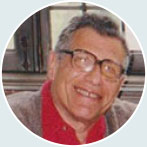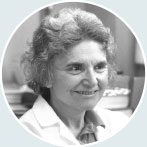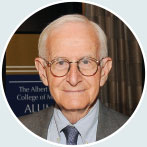
Error: No layouts found
We acknowledge with regret and appreciation the passing of the following Einstein faculty members. We honor and respect their memories and extend our deepest condolences to their families, former colleagues and friends.

Dr. Samuel Levine passed away on July 16, 2016, at age 88. Dr. Levine was an associate professor emeritus of physical medicine and rehabilitation at Einstein and founding clinical director of the Lubin Rehabilitation Center (now at Montefiore/Wakefield) of the Jack D. Weiler Hospital (now known as the Einstein-Weiler Hospital), a division of Montefiore.
Dr. Levine was on the Einstein faculty from 1967 until he retired in 1993 and was board-certified in physical medicine and rehabilitation. He earned his M.D. degree from New York University School of Medicine. He then completed an internship at Maimonides Hospital (now Maimonides Medical Center), an assistant residency in medicine at Montefiore Hospital and a senior residency in medicine at Kingsbridge Veterans Administration Hospital, followed by a fellowship in the office of vocational rehabilitation, physical medicine and rehabilitation at Montefiore. He served on many committees and was a member of the American Academy of Physical Medicine and Rehabilitation and other professional medical associations.

Dr. Thomas Aldrich died on September 5, 2016, at age 65, after a long battle with cancer. He was a professor of medicine and director of the pulmonary/critical care training program at Einstein and director of the pulmonary function laboratory at Montefiore.
Dr. Aldrich received his M.D. degree from the University of Minnesota. He completed his residency training at the University of California, Irvine, followed by fellowships at the University of Virginia and the University of Pennsylvania. He joined Einstein-Montefiore in 1982 and was division chief in pulmonary medicine from 1994 to 2007. He was also a member of the Montefiore Institutional Review Board.
Board-certified in internal medicine and clinical care medicine, Dr. Aldrich had a productive clinical research career, with a recent focus on the pulmonary physiology of the World Trade Center 9/11 cohort. He received numerous awards, including the ALA-Trudeau Scholar Award and the New York State Lung Association Amberson Award, and held five patents in oximetry.

Dr. Norman Bank, a professor emeritus of medicine, died on September 17, 2016. He was 90 years old.
Dr. Bank received his medical degree with honors from the Columbia College of Physicians and Surgeons in 1953. After more than a decade at New York University School of Medicine he came to Einstein, where he rose to the rank of professor of medicine. From 1971 to 2008 he was chief of the division of nephrology at Montefiore Medical Center.
He served as the president of the New York Society of Nephrology in 1972 and also was on several committees at the National Institutes of Health. His laboratory made numerous discoveries about kidney function in health and disease for which he received awards, among them the Distinguished Service Award from the National Kidney Foundation and the Service Award from the American Society of Nephrology.

Dr. Bertrand Bell, a distinguished professor emeritus of medicine and of family and social medicine at Einstein, passed away on October 4, 2016, at age 86.
Dr. Bell earned his medical degree from what is now the University at Buffalo School of Medicine and Biomedical Sciences. After a captainship in the Air Force Medical Service, he completed his residency in internal medicine at Jacobi Hospital and a fellowship in gastrointestinal medicine at Bellevue Hospital. For the next four years, he was in private practice and chief of staff at Calvary Hospital. He then returned to Jacobi, rising to the position of director of ambulatory care.
He joined the Einstein faculty in 1966 and mentored many Einstein students completing rotations in ambulatory care. Dr. Bell led a New York State–established panel that became known as the Bell Commission, which recommended limiting residents’ duty hours to 80 a week. He also championed window guards in apartment buildings, seat belts in taxis and improved training in emergency medicine.

Dr. Olga Blumenfeld, a professor emerita of biochemistry, passed away on October 31, 2016, at age 93. She was renowned for her work in human blood group matching.
Born in Poland in 1923, Dr. Blumenfeld escaped to the United States in 1942, where she studied biochemistry at City College. She completed her master’s degree at the University of Colorado and her Ph.D. at New York University.
Dr. Blumenfeld came to Einstein in 1960 as a postdoc working with Drs. Paul Gallop and Sam Seifter. She joined the Einstein faculty in 1962 and rose to the rank of professor in 1972. Many of her publications deal with the molecular basis for genomic diversification of a red cell family of glycoproteins called glycophorins. Her Blood Group Antigen Gene Mutation Database is still in use today. Working with her colleague Helen M. Ranney, M.D., she was among the first to detect the unusual hemoglobin known as HbA1c—the biomarker that has transformed the way diabetes is diagnosed, treated and prevented. Dr. Blumenfeld also chaired a committee on women’s rights at Einstein.

Dr. Harold Nitowsky, a clinical professor emeritus of obstetrics & gynecology and women’s health and of pediatrics, as well as a professor emeritus of genetics, died on November 12, 2016. He was 91.
After earning his medical degree from New York University School of Medicine, he completed his internship at Mount Sinai Hospital in New York and his residency in pediatrics at the University of Colorado Medical Center. During his postdoctoral fellowship in biophysics and pediatrics there, he earned a master’s degree in biophysics. He then served as a surgeon in the Public Health Service’s Communicable Disease Center.
Dr. Nitowsky arrived in the Bronx in 1967 from the Johns Hopkins School of Medicine. At Einstein, he founded and directed the Genetic Counseling Program, which included a mobile unit dubbed “Operation Gene Screen,” which screened for Tay-Sachs disease.
He also directed the genetics research center and the division of genetics in the department of pediatrics and the division of reproductive genetics in the department of obstetrics & gynecology and women’s health.

Dr. David Hamerman, a distinguished professor emeritus of medicine at Einstein and a founding faculty member, died on December 25, 2016. He was 91 years old.
Dr. Hamerman arrived at Einstein in 1955 as a junior member in the department of medicine. He rose through the ranks and pursued a productive career in rheumatology research, developing expertise in the metabolism of hyaluronate, now used as an injectable treatment for arthritic knees. He also assumed important leadership roles, beginning with his appointment as director of Einstein’s rheumatology division. In 1968, Dr. Hamerman became chair of the newly designated academic department of medicine at Montefiore.
After stepping down in 1979, he developed and led the geriatrics division and in 1992 became director of Einstein’s Jack and Pearl Resnick Gerontology Center. His textbook Geriatric Bioscience: The Link Between Aging and Disease (American Society for Clinical Investigation) was published in 2007.